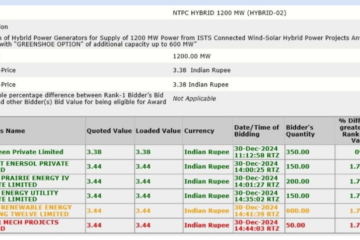Expression of Interest by SECI: For Setting up of Solar PV Manufacturing Capacities in India

Recently, the Ministry of New and Renewable Energy (MNRE), Government of India, had stressed to strengthen India’s manufacturing capabilities. For this MNRE released a concept note to upgrade country’s solar manufacturing supply chain. In this concept note, MNRE proposed to reduce dependency on foreign imports and create demands for local products. The government is thinking to adopt threepronged approach to encourage local manufacturing:
- Imposition of anti-dumping duty on modules and cells;
- Create local demand through domestic content requirement (DCR) programme; and
- Supporting manufacturers financially by facilitating several subsidies.
Also, MNRE has declared a clean energy rollout trajectory, which requires power plants of 77 GW total capacities by the year 2020. To deploy such huge amount of solar power there must be a need of huge raw materials and equipments. Under the ‘Make in India’ initiative of the Government of India, MNRE has decided to promote local manufacturers for this. Keeping this in mind that current available manufacturing facilities are not sufficient to support the target of 77 GW, MNRE is ensuring to set up adequate indigenous manufacturing facilities in India. The value of establishing 77 GW solar projects will require an investment of $54.56 billion.
To boost up India’s solar manufacturing sector, the Solar Energy Corporation of India (SECI) has invited Expression of Interest (EoI) for establishing 20 GW solar manufacturing facilities in India. Duration of setting up this integrated facility will be within 3 years. The aim of this scheme is to develop manufacturing facilities of at least 60% that should come from local manufacturing. MNRE will launch a programme, where power purchase agreements for 20 GW will be allocated though open tendering process. This scheme will ensure that the modules, wafers, and cells produced from manufacturing facilities, must be used in solar energy projects.
SALIENT FEATURES OF THE SCHEME
Selection of manufacturers
Selection of manufacturers will be decided by bidding process. Those who are willing to set up vertically integrated solar PV modules manufacturing facility will be able to participate in the bidding process. The manufacturing facility includes ingots, wafers, and cell and modules manufacturing. SECI has given freedom to prospective manufacturers to form joint ventures/consortiums with other entities. Even also as per the EOI document, the existing manufacturers, who are already in business of manufacturing of solar cells and modules and they intend to set up integrating solar manufacturing facilities are eligible to bid under this scheme. The set-up of manufacturing facilities by selected manufacturers should be done within the specified period.
Scheme capacity
The total scheme capacity will be of 20,000 MW in a single stage. The project is expected to complete in a phased manner within 4 years’ time. Depending upon the response of this scheme that capacity could be increased at a later stage as an extension.
Power purchase agreement (PPA)
With selected manufacturers at specified tariff, comes through competitive bidding process PPA for 25 years, which will be signed by SECI. The PPA will cover the milestones of project of setting up integrated solar manufacturing facilities.
PROJECT ALLOCATION
A total of 20 GW project capacities will be allocated to selected manufacturers based on inputs received through EOI from various prospective manufacturers. The phasing of manufacturing set-up will be 12 months and 18 months, respectively, for modules and ingot and wafers manufacturing from the issue date of the letter of intent.

DEVELOPMENT OF PROJECTS
The project can be developed anywhere in the country but shall be monitored through CTU or as directed by SECI in line with PSA arrangements with states. Also, it is said in the document that project could be set up in solar parks, if there is any capacity available in park. As per the EOI document, land for implementing projects will be arranged by the selected manufacturers only. In case of not meeting the deadlines or not able to attain milestone by the successful bidder the capacity allocation would be cancelled after 15 days’ notice. However, extension of timeline for valid reasons can be permitted by the competent authority.
SCHEME IMPLEMENTATION
SECI is the implementing agency of this project. It will take care of all the necessary arrangements for bidding process, such as inviting bids, finalizations of bids, and signing PPA with selected bidders. SECI will be responsible for motoring of the scheme, its implementation, and ensuring the progress of milestones. For the ease of bidders, SECI will provide suitable payment security mechanism. It will also help bidders in getting land, connectivity, and other clearances.
Mr Sarvesh Devraj, Research Associate, Renewable Energy Technology Applications, Renewable Energy Technologies Division, TERI, New Delhi.
